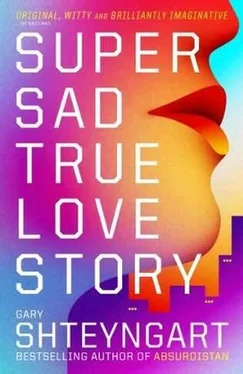Venezuelans detonating something other than an arepa.
What ever, as Eunice would say, if she still spoke to me.
I point my äppärät out the half-opened window, trying to catch a signal. I can’t reach my parents. I can’t connect to Westbury. I can’t connect to Vishnu. I can’t connect to Grace. And nothing from Nettie Fine. Complete radio silence since Noah’s ferry exploded. All I have is the Wapachung Contingency emergency scroll. “SECURITY SITUATION IN PROGRESS. REMAIN IN DOMICILE. WATER: AVAILABLE. ELECTRICITY: SPORADIC. KEEP ÄPPÄRÄT FULLY CHARGED IF POSSIBLE. AWAIT INSTRUCTIONS.”
In the next room, she’s crying.
I’m so scared.
I have no one.
Eunice, Eunice, Eunice. Why must you break my heart, again and again?
Five days after the Rupture, instructions.
WAPACHUNG CONTINGENCY EMERGENCY MESSAGE: SECURITY SITUATION LOWER/MID-MANHATTAN IMPROVED. PLEASE REPORT TO YOUR DIVISION HEADQUARTERS.
I put on a shirt and pants, feeling both scared and celebratory. The air conditioner had gone out and I had been living in my underwear, which made the pants feel like armor and the shirt like a shroud. Eunice was sitting by the kitchen table, staring absently at her nonfunctional äppärät. I have never smelled unwashed hair off her, but there it was, as strong as anything in the half-dead refrigerator. And that softened me for some reason, made me want to forgive her, to find her again, because whatever happened between us had nothing to do with me. “I have to go to work,” I said, kissing her on the forehead, not afraid to inhale what she had become.
She looked up at me for the first time in a hundred hours, eyes crusted over. “To see Joshie?” she said.
“Yes,” I said. She nodded. I stood there like a Japanese salaryman in my overwarm pants and stifling shirt, waiting for more. But it wouldn’t come. “I still love you,” I said. No response, but no dead smile either. “I think we both really tried to make this work. But we’re just too different. Don’t you think?” And then, before she could summon an emotion and deny it in the same breath, I left.
Outside, the streets were nearly empty. All the cabs had fled to wherever cabs come from, and that absence of moving yellow made Manhattan feel as still and silent as Kabul during Friday prayers. The Credit Poles were burned up and down Grand Street, and they looked like prehistoric trees after the glaciers retreated, their colored lights sagging down in a row of inverted parabolas, the racist Credit signs atop them torn down and ripped apart, coating the windshields of cars like old washrags. An old Econoline van with a bumper sticker that read “My Daughter Is a U.S. Marine in Venezuela” had also been torched for some reason-it lay on its back in the middle of the street, imitating a dead water bug. The A-OK Pizza Shack was open but had boarded up its windows, as had the local Arab bodega, the words “WE ACCEPT ONLY YUAN SORRY BUT WE ALSO HALF TO EAT” stenciled along each bit of cardboard. But, otherwise, the neighborhood looked remarkably intact, the looting minimal. The deep hush of the morning after a failed third-world coup seeped up from the streets and coated the silent towers. I was proud of New York, now more than ever, for it had survived something another city would have not: its own rage.
The F train entrance was stuffed with garbage, the subways clearly out. I walked up Grand, a lone man feeling the density of August along with the strange hunger of being alive, wondering what would come next. For one thing, I needed real money, not dollars.
Outside my Chinatown HSBC branch, a dragon’s tail of poor middle-class Chinese folk waited to hear the verdict on their life savings. I wondered if these ruined older men and women, the Tai Chi practitioners of Seward Park with their three-yuan trainers and mottled bald spots, could find a way to repatriate to the now wealthier land of their birth. Would they even be welcomed back? Would Eunice’s parents be if they decided to return to Korea?
I stood in line for an hour, listening to a Caribbean man dressed in head-to-toe denim, his cracked skin glistening with patchouli, sing to us his take on the world. “All these Wapachung people, all these Staatlin people, they takin the money and runnin. They messin up the economy, they messin up our pockets. This is extortion. This is Mafia doin. Why they shoot that ferry down? Who control who? That’s what I askin you. And you know we never fine out the answer, because we little people.”
I wanted to give the man an answer he could live with, but my throat remained blank, even as my mind was running. Not now, not now. Save the questions for Joshie.
My bank account was still big enough to warrant a special teller, an old Greek woman imported from a ransacked Astoria branch, who laid it all out for me. Everything I owned that had been yuan-pegged was relatively intact, but my AmericanMorning portfolio-LandOLakes, AlliedWasteCVS, and the former conglomeration of cement, steel, and services that had once formed an advanced economy-no longer existed. Four hundred thousand yuan, two years of self-denial and bad tipping at restaurants, all gone. Together with the Eunice-related expenditures of the past month, I was down to 1,190,000 yuan. From the standpoint of immortality, I was already on the mortuary slab. From the standpoint of survival, the new gold standard for all Americans, I was doing just fine. I took out two thousand yuan, Chairman Mao’s solid face and remarkable hairline staring back at me from the hundred-note currency, and hid the bills in my sock. “You’re the richest man in Chinatown,” the teller snorted. “Go home to your family.”
My family. How were they surviving? What had happened on Long Island? Would I ever hear the warble of their anxious birdsong again? On a street corner I saw a man flagging down a car, then bargaining over the price of a ride. My father had told me this is how he used to get around Moscow when he was young, once even flagging down a police car, its captain looking to make a ruble. I stuck out my hand, and a Hyundai Persimmon decked out in all things Colombian pulled up to me. I negotiated twenty yuan to the Upper East Side, and for the next few minutes the city slid past me, demure and empty against the outrageously joyous salsa that colored the inside of the Hyundai. My driver was something of an entrepreneur and on the way over sold me a hypothetical bag of rice that would be delivered to my apartment by his cousin Hector. “I used to be scared of things before,” he said, pulling down his sunglasses to show me his sleepless eyes, their brown orbs swimming in the colors of the first and last bars of the Colombian flag, “but now I see what our government is. Nothing inside! Like wood. You break it open, nothing . So now I’m going to live my life. And I’m going to make some money. Real money. Chinese money.” I tried to be his friend and economic confidant for the duration of the ride, saying, “Mhh-mm, mhh-mm,” in the usual noncommittal tone I use with people I have nothing in common with, but when we got to my destination, he hit the brakes. “ Salte, hijueputa! ” he shouted. “Out! Out! Out!” I clambered out of the car, which squealed immediately in the opposite direction, the fare left uncollected.
The street was full of National Guard.
I had not seen any military on the streets since I left my apartment, but the Post-Human Services synagogue was entirely surrounded by armored personnel carriers and Guardsmen, whom my äppärät cheerfully identified as Wapachung Contingency. (In fact, upon closer inspection, the National Guard flags and insignia were almost completely scraped off their vehicles and uniforms; now these men were pure Wapachung.) They were protecting the doors of the building from a riotous horde of young people, apparently our just-fired employees, our beautiful Daltons, Logans, and Heaths, our Avas, Aidens, and Jaidens, who had tormented me in the Eternity Lounge and were now massed against Joshie’s synagogue, the very source of their identity, their ego, their dreams. My nemesis Darryl, the SUK DIK guy, was jumping around like a locust on fire, trying to get my attention. “Lenny!” he shouted to me, as I walked up to the Guardsmen at the door, had my äppärät scanned, and was curtly nodded admission. “Tell Joshie this isn’t fair! Tell Joshie I’ll work for half-salary. I’m sorry if I hurt your feelings! I was going to stand up for you at the Miso Pig-Out in November. Come on, Lenny!”
Читать дальше












